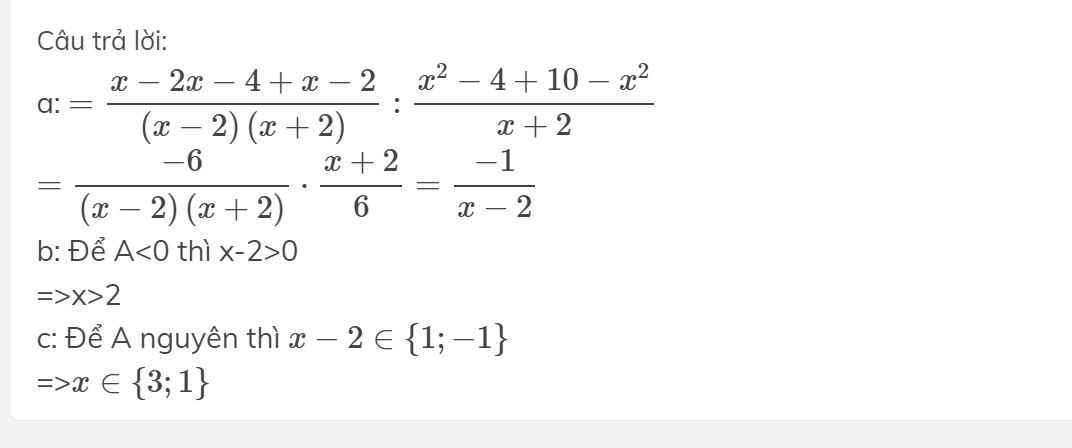Tìm x nguyên để A=4√x -10/√x -2 nguyên
Hãy nhập câu hỏi của bạn vào đây, nếu là tài khoản VIP, bạn sẽ được ưu tiên trả lời.


\(A=\left(\dfrac{x}{x^2-4}+\dfrac{2}{2-x}+\dfrac{1}{x+2}\right):\left(x-2+\dfrac{10-x^2}{x+2}\right)\)
\(\Rightarrow A=\left(\dfrac{x-2\left(x+2\right)+1\left(x-2\right)}{\left(x-2\right)\left(x+2\right)}\right):\left(\dfrac{\left(x-2\right)\left(x+2\right)+10-x^2}{x+2}\right)\)
\(\Rightarrow A=\left(\dfrac{-6}{x^2-4}\right):\left(\dfrac{6}{x+2}\right)\)
\(\Rightarrow A=-\dfrac{6}{x^2-4}.\dfrac{x+2}{6}=-\dfrac{6\left(x+2\right)}{\left(x-2\right)\left(x+2\right)6}=-\dfrac{1}{x-2}\)
để A<0 thì :
\(\left\{{}\begin{matrix}x-2\ne0\\x-2\notin Z-\end{matrix}\right.\)\(\Leftrightarrow x\in\left\{3;4;5;6;7;8;9;....n\right\}\)
( Z- là tập hợp số nguyên âm )
Để A có giá trị nguyên thì :
\(\left\{{}\begin{matrix}x-2=1\\x-2=-1\end{matrix}\right.\Leftrightarrow\left\{{}\begin{matrix}x=3\\x=1\end{matrix}\right.\)

Lời giải:
ĐKXĐ: $x\neq \pm 2$
\(A=\left[\frac{x}{(x-2)(x+2)}-\frac{2(x+2)}{(x-2)(x+2)}+\frac{x-2}{(x+2)(x-2)}\right]:\frac{x^2-4+10-x^2}{x+2}\\ =\frac{x-2(x+2)+x-2}{(x-2)(x+2)}:\frac{6}{x+2}\\ =\frac{-6}{(x-2)(x+2)}.\frac{x+2}{6}\\ =\frac{-1}{x-2}=\frac{1}{2-x}\)
Để $A<0\Leftrightarrow \frac{1}{2-x}<0$
$\Leftrightarrow 2-x<0\Leftrightarrow x>2$
Kết hợp với ĐKXĐ suy ra $x>2$
b.
Với $x$ nguyên, để $A$ nguyên thì $1\vdots 2-x$
$\Rightarrow 2-x=1$ hoặc $2-x=-1$
$\Rightarrow x=1$ hoặc $x=3$

a) ĐKXĐ: x∉{2;-2}
b) Ta có: \(A=\dfrac{x}{x-2}+\dfrac{2-x}{x+2}+\dfrac{12-10x}{x^2-4}\)
\(=\dfrac{x\left(x+2\right)}{\left(x-2\right)\left(x+2\right)}-\dfrac{\left(x-2\right)^2}{\left(x+2\right)\left(x-2\right)}+\dfrac{12-10x}{\left(x-2\right)\left(x+2\right)}\)
\(=\dfrac{x^2+2x-x^2+4x-4+12-10x}{\left(x+2\right)\left(x-2\right)}\)
\(=\dfrac{-4x+8}{\left(x+2\right)\left(x-2\right)}\)
\(=\dfrac{-4\left(x-2\right)}{\left(x+2\right)\left(x-2\right)}\)
\(=\dfrac{-4}{x+2}\)
c) Để \(A=\dfrac{2}{3}\) thì \(\dfrac{-4}{x+2}=\dfrac{2}{3}\)
\(\Leftrightarrow x+2=\dfrac{-4\cdot3}{2}=-\dfrac{12}{2}=-6\)
hay x=-6-2=-8(nhận)
Vậy: Để \(A=\dfrac{2}{3}\) thì x=-8
d) Để A nguyên thì \(-4⋮x+2\)
\(\Leftrightarrow x+2\inƯ\left(-4\right)\)
\(\Leftrightarrow x+2\in\left\{1;-1;2;-2;4;-4\right\}\)
\(\Leftrightarrow x\in\left\{-1;-3;0;-4;2;-6\right\}\)(nhận)
Vậy: Để A nguyên thì \(x\in\left\{-1;-3;0;-4;2;-6\right\}\)

a)
Gọi x là số cần tìm, ta có:
\(x+2>0\left(x>0\right)\)
\(\Rightarrow x-4< 0\)
\(\Rightarrow x< 4\)
\(x=\left\{1;2;3\right\}\)
b)
Gọi x là số cần tìm, khi đó:
\(x-2< 0\left(x< 0\right)\)
\(x+4>0\left(\forall x>-4\right)\)
\(\Rightarrow x=\left(-3;-2;-1\right)\)

a: \(A=\dfrac{x^2-5x+6-x^2+x+2x^2-6}{x\left(x-3\right)}=\dfrac{2x^2-4x}{x\left(x-3\right)}=\dfrac{2x}{x-3}\)
